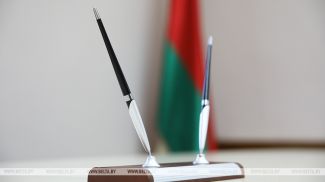
MINSK, August 4 (BelTA) – Companies from 60 Russian regions have been conducting trade deals on the Belarusian Universal Commodity Exchange (BUCE), the BUCE press service told BelTA.
According to an analytical report released by BUCE, between January and July 2025, companies from 60 Russian regions participated in purchase/sale transactions on the Belarusian exchange platform. That was 12 regions more than during the same period in 2024. This expansion, along with the accreditation of 405 new Russian residents, contributed to a 26% increase in exchange-based trade turnover with Russia, reaching $634 million.
BUCE data shows that Belarusian exports dominate the exchange trade, accounting for 85% of the total volume. This year, Russian companies have been particularly active in purchasing meat products, butter, powdered milk, feed additives and timber through the exchange. Supplies to Belarus made up 14% of the total transaction value from Russian participants, primarily involving coal, ferrous metals and related products, as well as a wide range of industrial and consumer goods. Additionally, Russian resident companies utilized the BUCE platform to trade with companies from other Russian regions and third countries, with such transit operations accounting for 1% of all exchange deals involving Russian participants.
The top five Russian regions by contract value were Moscow Oblast, Leningrad Oblast, Smolensk Oblast, the Republic of Tatarstan and Belgorod Oblast. Notably, all top-five regions improved their trade performance on BUCE compared to the previous year. The highest growth rates were recorded in trade with Belgorod Oblast (3.5-fold increase) and Smolensk Oblast (2-fold increase), while Tatarstan saw a 139% rise, Leningrad Oblast 131% and Moscow Oblast 102%.
As of 4 August 2025, BUCE had accredited 4,663 Russian residents, including seven exchange brokers.
The public joint-stock company (OAO) Belarusian Universal Commodity Exchange was established in 2004, with its first trading session conducted in June 2005. BUCE is one of the largest mercantile exchanges in Eastern Europe. Its key function is to assist Belarusian companies with exporting their products and assist foreign companies with entering the Belarusian market. The commodity exchange facilitates trade in metals, timber, agricultural products, and a broad choice of industrial and consumer goods.
According to an analytical report released by BUCE, between January and July 2025, companies from 60 Russian regions participated in purchase/sale transactions on the Belarusian exchange platform. That was 12 regions more than during the same period in 2024. This expansion, along with the accreditation of 405 new Russian residents, contributed to a 26% increase in exchange-based trade turnover with Russia, reaching $634 million.
BUCE data shows that Belarusian exports dominate the exchange trade, accounting for 85% of the total volume. This year, Russian companies have been particularly active in purchasing meat products, butter, powdered milk, feed additives and timber through the exchange. Supplies to Belarus made up 14% of the total transaction value from Russian participants, primarily involving coal, ferrous metals and related products, as well as a wide range of industrial and consumer goods. Additionally, Russian resident companies utilized the BUCE platform to trade with companies from other Russian regions and third countries, with such transit operations accounting for 1% of all exchange deals involving Russian participants.
The top five Russian regions by contract value were Moscow Oblast, Leningrad Oblast, Smolensk Oblast, the Republic of Tatarstan and Belgorod Oblast. Notably, all top-five regions improved their trade performance on BUCE compared to the previous year. The highest growth rates were recorded in trade with Belgorod Oblast (3.5-fold increase) and Smolensk Oblast (2-fold increase), while Tatarstan saw a 139% rise, Leningrad Oblast 131% and Moscow Oblast 102%.
As of 4 August 2025, BUCE had accredited 4,663 Russian residents, including seven exchange brokers.
The public joint-stock company (OAO) Belarusian Universal Commodity Exchange was established in 2004, with its first trading session conducted in June 2005. BUCE is one of the largest mercantile exchanges in Eastern Europe. Its key function is to assist Belarusian companies with exporting their products and assist foreign companies with entering the Belarusian market. The commodity exchange facilitates trade in metals, timber, agricultural products, and a broad choice of industrial and consumer goods.













